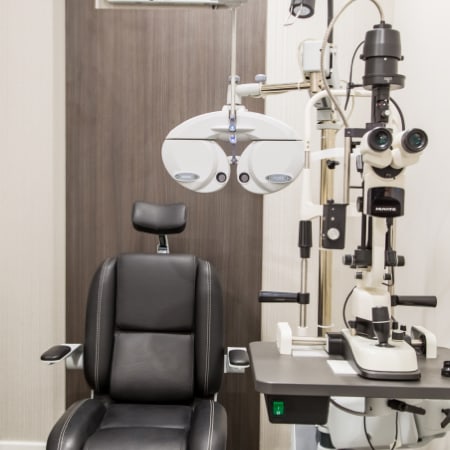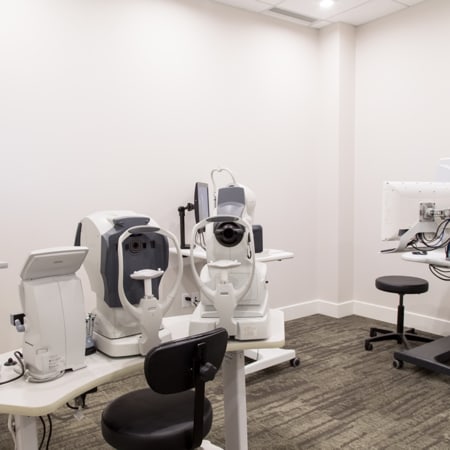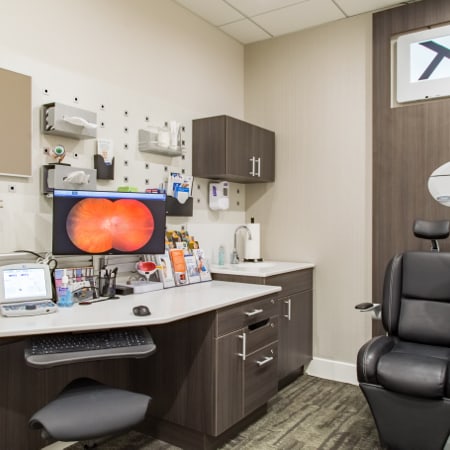Treating Your AMD Needs
At Upper Richmond Optometry, we are passionate about treating age-related macular degeneration (AMD) in our community. From our dedicated staff to modern technology and treatment methods, we have earned the distinction of being named an AMD Centre of Excellence by the Macular Degeneration Association.
We are here to discuss all of your AMD questions or concerns. Contact us today to set up an appointment for a comprehensive eye exam and to talk about a personalized AMD treatment plan.

What Is AMD?
Age-related macular degeneration, or AMD, occurs when the macula of the eye becomes damaged due to age. The macula controls sharpness in your central vision—AMD can cause wavy or blurry vision and even vision loss in late stages if left untreated.
This is a common condition in older adults but can make it difficult to drive, read, or see faces clearly.

Supplements for AMD
Supplement options that we provide in our practice are clinically proven to help restore macular health. To learn more about MacuHealth supplements, take a look at this video.
Contact us today to discuss the MacuHealth range of supplements.
MacuHealth Vision Supplements are formulated to rebuild macular pigment to enhance your vision. MacuHealth uses all 3 macular carotenoids: lutein, meso-zeaxanthin, and zeaxanthin, which can help to maximize your macular pigment protection and help prevent AMD in the future.
MacuHealth Plus Supplements are meant for those who are already diagnosed with early to intermediate stages of AMD. MacuHealth Plus is formulated based on the AREDS2 study and has proven to protect vision and rebuild macular pigment using the triple carotenoid formula. This formula is formulated with lower levels of zinc than the original.

Types of AMD
There are different types of AMD that present different symptoms depending on the stage you are in. The two most common types of AMD are wet and dry, but subclinical AMD can appear in early cases.
Early symptoms can include mild blurring and problems seeing in your central vision. Late-stage symptoms can include wavy vision and blurred central vision. Symptoms of AMD often don’t show up until later stages.
Subclinical AMD can occur at a very early stage when vision is generally clear, and AMD does not appear in clinical testing. The earliest sign of subclinical AMD is typically problems with night vision. This can often be experienced up to 3 years before AMD is detected, so it is important to be aware of it.
Dry AMD is the most common form of AMD and refers to the macula getting thinner due to age and the presence of drusens. Drusens are soft, pebble-like deposits that develop on the macula.
Dry AMD occurs in 3 stages: early, intermediate, and late. Treatment is most successful in early and intermediate stages, and AMD tends to progress slowly through the stages as you age.
Wet AMD is a less common form but usually results in faster vision loss. Wet AMD is associated with the later stages of AMD and occurs when blood vessels start to grow in the back of the eye, damaging the macula.
Technology We Use to Diagnose AMD
At our AMD Centre of Excellence, we use modern technology to diagnose our patients with AMD before it progresses into the later stages. This technology allows us to find treatment options for our AMD patients based on their unique needs.
Optical coherence tomography angiography (OCTA) is a retinal imaging system that takes cross-sectional images using light waves. This high-resolution imaging allows for a detailed and layered view of the retina, which helps to diagnose macular thinning or distortion related to AMD.
AdaptDx Pro uses technology and eye tracking to capture dark adaptive functions. To capture this, you would normally need a dark room, but AdaptDx Pro eliminates the need for this by creating a light-proof seal.
AdaptDx Pro’s measurement of dark adaptation is 90% sensitive to the presence of AMD, helping to detect AMD before progression into later stages.
Genetics can be a key factor in the development of AMD, and there have been over 30 genomes associated with the risk of AMD. Currently, genetic testing for AMD is not a widely used practice, but it does shed an interesting light on how we can understand risk as further research comes out.
Macumira for AMD
Macumira is Canada’s first clinically proven and approved treatment for dry AMD. The device uses microcurrents and patented waveforms to help improve cellular function and clear drusens.
In a clinical trial, 48% of patients improved by at least 10 letters of the acuity chart, and all patients showed improvement overall.
Visit Our AMD Centre of Excellence
Talk to us about our modern approach to diagnosing and treating all stages of AMD. Book an appointment today to get started.















